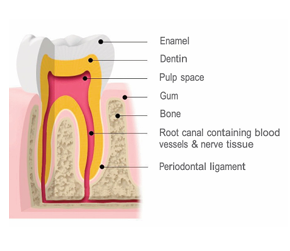Understanding Dental Pulp Inflammation: Causes that lead to root canal treatments
- Jorvik Dental Practice

- Aug 23
- 3 min read
The dental pulp is a vital part of your tooth, containing nerves, blood vessels, and connective tissue. When this inner tissue becomes irritated or infected, it can lead to significant discomfort and dental problems. Understanding the causes of dental pulp issues is essential for maintaining oral health and preventing more severe complications.
What Are Dental Pulp Issues?
Dental pulp issues refer to problems affecting the soft tissue inside the tooth. This tissue is responsible for nourishing the tooth and providing sensory function. When the pulp is damaged or inflamed, it can cause pain, sensitivity, and even tooth loss if left untreated.
Common dental pulp issues include:
Pulpitis (inflammation of the pulp)
Pulp necrosis (death of pulp tissue)
Abscess formation
These conditions often arise due to infections or trauma and require prompt attention to avoid further damage.

Common Causes of Dental Pulp Issues
Several factors can lead to dental pulp problems. Understanding these causes helps in prevention and early detection.
Tooth Decay
The most frequent cause of dental pulp issues is tooth decay. When bacteria penetrate the enamel and dentin layers, they reach the pulp, causing irritation and infection. Untreated cavities can quickly progress to pulpitis.
Dental Trauma
Physical injury to a tooth, such as a crack or fracture, can expose the pulp to bacteria and external irritants. Even if the damage is not visible, trauma can disrupt blood flow to the pulp, leading to inflammation or death of the tissue.
Gum Disease
Severe gum disease can affect the supporting structures of the tooth and allow bacteria to reach the pulp through the root canals. This can result in pulp infection and abscess formation.
Other Factors
Deep cracks or fractures in teeth
Excessive grinding or clenching (bruxism)
Chemical irritation from dental materials
Recognising these causes early can help you seek timely dental care and avoid complications.
How do you treat inflamed tooth pulp?
When the dental pulp becomes inflamed, treatment depends on the severity and cause of the inflammation. Early intervention can save the tooth and relieve pain.
Conservative Treatments
Pulp Capping: If the pulp is only mildly inflamed, a protective dressing can be placed to encourage healing.
Antibiotics and Pain Relief: In some cases, medication may be prescribed to reduce infection and discomfort.
Root Canal Therapy
For more severe inflammation or infection, root canal treatment is often necessary. This procedure involves:
Removing the inflamed or infected pulp tissue.
Cleaning and disinfecting the root canals.
Filling and sealing the canals to prevent reinfection.
Restoring the tooth with a crown or filling.
Root canal therapy is highly effective in preserving the natural tooth and preventing extraction.
Tooth Extraction
If the pulp damage is extensive and the tooth cannot be saved, extraction may be the only option. After removal, options like dental implants or bridges can restore function and appearance.
Preventive Measures Post-Treatment
Maintain good oral hygiene.
Avoid chewing hard foods on the treated tooth initially.
Attend regular dental check-ups.
Early diagnosis and treatment of pulp inflammation can prevent pain and tooth loss.
Preventing Dental Pulp Issues
Prevention is always better than cure. Here are practical steps to protect your dental pulp:
Maintain Oral Hygiene: Brush twice daily with fluoride toothpaste and floss regularly.
Regular Dental Visits: Professional cleanings and check-ups help detect problems early.
Protect Teeth from Injury: Use mouthguards during sports and avoid biting hard objects.
Limit Sugary Foods and Drinks: Reduce the risk of tooth decay by cutting down on sugar intake.
Address Teeth Grinding: Seek treatment if you grind or clench your teeth, as this can damage the pulp.
By following these recommendations, you can reduce the risk of developing dental pulp issues and maintain healthy teeth.
When to See a Dentist
If you experience any of the following symptoms, it is important to consult a dentist promptly:
Persistent toothache or sensitivity to hot and cold
Swelling or tenderness around a tooth
Discolouration of a tooth
Pain when biting or chewing
Bad taste or smell in the mouth
These signs may indicate dental pulp inflammation or other serious dental problems that require professional care.
Taking action early can save your tooth and prevent more complex treatments. Regular dental check-ups can prevent and spot issues before any of the symptoms develop.
Understanding the causes and treatments of dental pulp issues empowers you to take control of your oral health. With proper care and timely dental visits, you can protect your teeth and enjoy a healthy smile for years to come.
For more information on saving teeth, visit




Comments